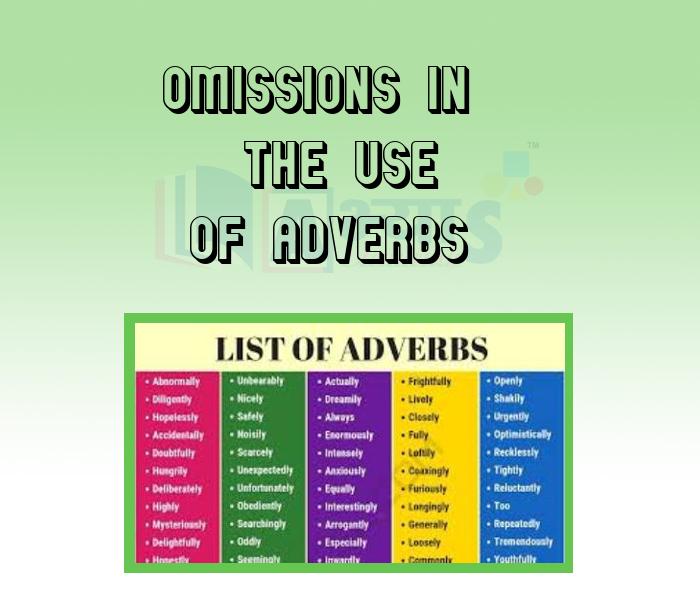Omissions in the use of Adverbs







Omissions in the use of Adverbs
Omissions in the use of Adverbs: An adverb is a word that adds something to the meaning of a verb, an adjective or another adverb.
A) ‘No sooner’ takes conjunction ‘than’ while hardly/scarcely takes conjunction ‘when’.
B) Much too is followed by Unpleasant Adjective, whereas too much is followed by Noun.
C) Quite and all are not used together.
D) Too means more than required and it is used with Unpleasant Adjective. So, we cannot use too glad, too happy, too pleasant, too healthy.
E) A sentence which is based on ”Too …. To” format, we cannot replace ‘to’ with ‘so that’. If we replace to with so that, too also must be replaced with cannot.
Identify the word which is to be removed from the following sentence to make it grammatically correct . I am too glad to meet you. | |||
| Right Option : B | |||
| View Explanation | |||
Identify the correct word which is omitted in the following sentence and fill in the blank part . His failure is much ____________ painful for me. | |||
| Right Option : B | |||
| View Explanation | |||
Identify the correct word which is omitted in the following sentence and fill in the blank part . He received a call from his father . _____________ , He left . | |||
| Right Option : C | |||
| View Explanation | |||
Students / Parents Reviews [10]
It was good as the experience because as we had come here we had been improved in a such envirnment created here.Extra is taught which is beneficial for future.

Eshan Arora
8thAbout Abhyas metholodology the teachers are very nice and hardworking toward students.The Centre Head Mrs Anu Sethi is also a brilliant teacher.Abhyas has taught me how to overcome problems and has always taken my doubts and suppoeted me.

Shreya Shrivastava
8thAbhyas Methodology is very good. It is based on according to student and each child manages accordingly to its properly. Methodology has improved the abilities of students to shine them in future.

Manish Kumar
10thOne of the best institutes to develope a child interest in studies.Provides SST and English knowledge also unlike other institutes. Teachers are co operative and friendly online tests andPPT develope practical knowledge also.

Aman Kumar Shrivastava
10thIt was a good experience with Abhyas Academy. I even faced problems in starting but slowly and steadily overcomed. Especially reasoning classes helped me a lot.

Cheshta
10thIt has a great methodology. Students here can get analysis to their test quickly.We can learn easily through PPTs and the testing methods are good. We know that where we have to practice

Barkha Arora
10thBeing a parent, I saw my daughter improvement in her studies by seeing a good result in all day to day compititive exam TMO, NSO, IEO etc and as well as studies. I have got a fruitful result from my daughter.

Prisha Gupta
8thMy experience with Abhyas is very good. I have learnt many things here like vedic maths and reasoning also. Teachers here first take our doubts and then there are assignments to verify our weak points.

Shivam Rana
7thA marvelous experience with Abhyas. I am glad to share that my ward has achieved more than enough at the Ambala ABHYAS centre. Years have passed on and more and more he has gained. May the centre flourish and develop day by day by the grace of God.

Archit Segal
7thMy experience with Abhyas academy is very good. I did not think that my every subject coming here will be so strong. The main thing is that the online tests had made me learn here more things.
